Stars! Supernova Genesis Preview
Serious strategy fans will soon have something to get excited about, as the sequel to Stars! is nearing release.
A sad fact about this industry is that great reviews for a PC game don't always translate into great sales. Such was the case with Stars!, which was originally released as shareware before being picked up for an early 1997 release by Empire Interactive. Despite glowing praise from nearly every magazine and gaming site worth reading and from a loyal, dedicated fan base, the game enjoyed only moderate success at retail.
Three years later, serious strategy fans are still playing Stars! or, even more telling, trying to find copies to purchase. Any game with that sort of longevity simply begs for a sequel, and that's just what developer Mare Crisium and publisher Empire Interactive are set to bring us sometime this fall. Founded in 1997 by Jeff McBride and two other members of the team that created Stars!, Mare Crisium is a small development house compared with others in the PC gaming world - but that's not stopping it from setting some rather lofty goals for Stars! Supernova Genesis.
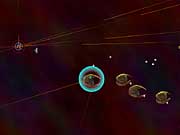
On the company's web site, for instance, you'll see titles like Master of Orion, Ascendancy, Reach for the Stars, Alpha Centauri, and M.U.L.E. (and Stars! itself) bandied about in the same breath as Stars! Supernova Genesis. The guys at Mare Crisium obviously love these classics (Stars! certainly borrowed concepts from them), but they also feel that all too often there's too much emphasis placed on micromanagement of resources and production instead of on strategy, especially as a game progresses. "My biggest complaint about most games in this genre, like Master of Orion II, is that as the number of units you own goes up linearly, the amount of time it takes to give them orders goes up exponentially," says McBride.
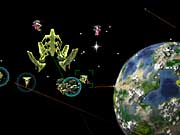
Then again, the scope of the turn-based Stars! Supernova Genesis is so breathtaking that perhaps the desire to reduce micromanagement was born as much of necessity as it was of taste. Just a glance at some of the technology that you can develop will give you an idea of the replayability this game will offer: The latest build features 30 hull types for vehicles, nearly 30 beam weapons, 16 engine types, 16 torpedoes and missiles, a dozen types of bombs and shields apiece... you get the idea. Add in a huge variety of ways to customize the various races in the game, the ability to tweak everything from AI to scenario settings quickly and easily through a GUI interface, and universes that can accommodate up to 16 power-hungry players, and it's obvious that Supernova Genesis aims to be a game of epic scope.
Stars! Supernova Genesis opens with a standard theme of conquer-the-galaxy games - your planet is set to be vaporized in 50 years when a nearby star goes supernova. But the game ends with a nice little twist: Just as you're resigned to the fact that your entire race will wind up crispy critters, a mysterious ship loaded with all the tools necessary for galactic colonization arrives and puts its cargo at your disposal. This intro sequence serves a dual purpose: It introduces a race called the Mystery Traders, which you'll have to deal with later in the game, and it sets the overarching plot of the game in motion. As McBride notes, "Players can't help but wonder what's in it for the race that saved you - what's in it for them? Good questions. Over the course of the various solo and multiplayer scenarios, you'll see hints and rumors that give you an idea of what's going on in the universe as a whole - and what your place is in the grand scheme of things."
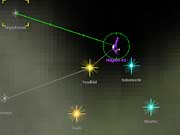
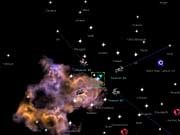
Then there are the social models. Are you a war monger by nature, or are you more of a cloak-and-dagger player? Perhaps you see your race as arch environmentalists or as regular jack-of-all-trades kinds of guys. McBride says, "The choice you make impacts the factors that cause population to flow from place to place, how satisfaction is determined, and so on."
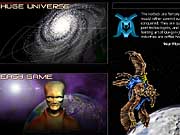
The crowning touch in race creation involves the individual mix-and-match traits such as improved fuel efficiency and advanced remote mining. These let you fine-tune your race to fit the specific strategy, play style, or character you envision. When these traits are combined with the race settings for habitability ranges, technological proficiency, productivity, and so on, the variety of possible, playable races is almost unlimited. And don't forget - players will be able to tweak these and many other game variables at will!
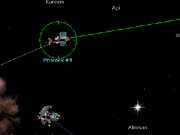
Games start off simply enough, as you decide on production queues for your single planet and begin sending probes and colony ships to explore nearby star systems. Naturally, you must decide which areas of technology take priority in the research department, and there's always the need to gather raw materials to fuel growth. But as you begin to mine or colonize planets and subsequently send out offensive and defensive ships to protect your holdings, things can get a bit complicated. McBride and the Mare Crisium team realized this, and they have taken a variety of steps to make empire management more pleasurable than painful.
Keeping track of dozens of ships and ensuring that each planet under your control focuses on the needs that are most critical to your success have the potential to result in gameplay that plods along like the Volga Boatman, but a variety of features in Supernova Genesis help ease the burden of ruling a galactic empire. Reports on every aspect of your domain - research, spies, fleets, colonies, and so forth - can be quickly and easily called up and sorted using standard Windows controls such as ctrl-click or shift-click. Ships and fleets can be grouped in similar fashion, and then all can be given the same order - or, if need be, a command to continually repeat a process until they are told to do otherwise. Afraid you might forget about them and leave them in a time-wasting loop? Use the remind option to automatically inform you of the status of spies, fleets, and other units.
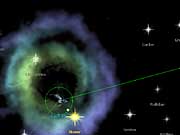

One area where Stars! fell a bit short in its original incarnation was smooth support for Internet play. This time around, however, the Mare Crisium team has not only implemented easy-to-use modes for Internet play, but has also taken the usual paradigms for victory and given them a firm tweak on the nose. Perhaps the most unique change is the addition of "non-zero sum" games, where it's possible for several players to win.
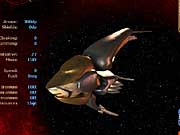
A multiplayer match of Stars! Supernova Genesis can last as long as several months or can be finished in a single afternoon, depending on how the game has been set up. "It's possible to set up a multiplayer game designed for players that want to all get online at the same time on a Saturday afternoon and have turns generated every five minutes, and in that case, it isn't hard at all to finish a small game in an afternoon," McBride says. But you can also create a huge, turn-a-day game with the intention that many players from all over the world will join, fully aware that such a game may take months to finish. McBride contends, "There's very little difference between a long- duration game and a persistent online-universe game such as Ultima Online. In both cases, it's the role-playing, character development, and sense of community that draws in the players and keeps them interested."
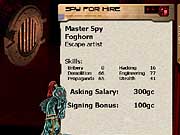
McBride contends that Supernova Genesis will ship sometime in September or October, but don't be surprised if the game's release gets pushed back a few weeks. To stay on top of any changes that the guys at Mare Crisium decide to implement between now and the final release - and I'd be surprised if there aren't at least a few - visit the web site from time to time between now and when the game hits stores.
Got a news tip or want to contact us directly? Email news@gamespot.com
Join the conversation